By MARI YAMAGUCHI Associated Press
TOKYO (AP) — Japan Airlines has named Mitsuko Tottori as its first woman president following a collision between one of its planes and a coast guard aircraft during Japanese New Year holidays that left five dead.
Tottori—currently senior managing executive officer of JAL and the first woman to climb the ranks from cabin attendant to the company’s new head—vowed Wednesday in a press conference to stick to her commitment to aviation safety and making it a priority.
She will take office in April and replace JAL president and CEO Yuji Akasaka, who will take over from Yoshiharu Ueki as chairman of the airline.
Tottori’s appointment came two weeks after the fatal collision at Tokyo’s busy Haneda airport that was mostly seen as a result of human error.
On Jan.2, JAL’s Airbus A350-900 carrying 379 passengers and crew landed right behind the coast guard’s much smaller Bombardier Dash-8 preparing to take off on the same seaside runway. The crash engulfed both aircraft in flames.
All passengers of the JAL airliner were safely evacuated in 18 minutes, but five of six coast guard flight crew died.
Tottori also praised the JAL Flight 516 cabin attendants’ commitment to safety, evacuating everyone on board, and thanked the passengers for their cooperation.
“But there was an accident and that means there are things we still need to improve.”
An ongoing probe into the collision has focused on whether the coast guard aircraft was given the green light for takeoff. A partial release of the air traffic control transcript showed no clear takeoff approval was given to the Bombardier, which was on a mission to deliver relief supplies to the residents in Japan’s north-central region hit by a magnitude 7.6 quake on New Year’s Day and hundreds of aftershocks.
JAL’s serving president, Akasaka, said that he hopes the investigation would provide “lessons to be learned.” He also pointed out that an analog element of relying on voice communication between pilots and traffic control has been an industry-wide safety risk internationally.
“I believe the analog voice communication is definitely one of the major risks,” said Akasaka, in his first news conference since the Jan. 2 collision.
Tottori, seated next to Akasaka, said her commitment to safety was rock-hard. She started her career as a flight attendant in 1985 when JAL Flight123 crashed into a mountain north of Tokyo. It was the world’s worst single-aircraft disaster, killing 520 people. Only four survived.
“The shock at that time is still deeply carved in my heart. And I have maintained a strong sense of responsibility to hand down the importance of aviation safety to younger generations,” Tottori said. “Safety is the foundation of an airline company and I will work on safe operations with even stronger conviction.”
Also Wednesday, Coast Guard Commandant Shohei Ishii, in his first appearance since the collision, apologized to the public and JAL flight crew and passengers for causing concern and trouble and offered his condolences to the five victims of his organization.
Ishii promised “full cooperation” with the transport safety board and police investigation into the collision, saying the organization will “do its utmost to reinforce safety measures based on the findings.” But he declined to comment on the coast guard’s own findings or the possible cause of the clash.
The coast guard has since suspended flights at its Haneda base, home to the Bombardier, for accident response and to address mental distress among its members. Ishii said the coast guard also conducted an emergency review of its aviation safety manual and procedures.




